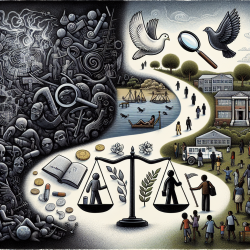Introduction
The intersection of health crises and immigration policy is a complex and multifaceted issue that has been brought to the forefront by recent global events. A recent study titled "The effects of the global health crisis on U.S. immigration policies: shifting political agenda-setting and the mobility crisis of immigrants" provides valuable insights into how health crises like Ebola, Zika, and COVID-19 have influenced U.S. immigration policy. This blog will explore the findings of this study and discuss how practitioners can use these insights to improve their understanding and approach to immigration policy during health crises.
Key Findings from the Study
The study utilized Kingdon’s Multiple Streams Framework to analyze U.S. House immigration bills from 2013 to 2021. The qualitative content analysis revealed three major themes:
- During public health crises, restrictive immigration bills tend to rise sharply.
- Elected representatives from Southern States are more likely to introduce restrictive immigration bills during health crises.
- Restrictive immigration bills are more likely to receive partisan support during health crises.
These findings highlight the need for inclusive agenda-setting during health crises and suggest adaptive measures to support underprivileged immigrant communities with increased access to healthcare and public support.
Implications for Practitioners
For practitioners working in fields related to immigration and public health, these findings offer several actionable insights:
- Data-Driven Decision Making: Practitioners should rely on data and research to inform their understanding of immigration policy trends during health crises. This approach can help identify patterns and anticipate policy shifts.
- Advocacy for Inclusive Policies: The study emphasizes the importance of advocating for policies that are inclusive and supportive of immigrant communities, particularly during health crises.
- Collaboration with Policymakers: Engaging with policymakers to provide evidence-based recommendations can help shape more equitable immigration policies.
Encouraging Further Research
While the study provides valuable insights, it also underscores the need for further research in this area. Practitioners are encouraged to explore the following research avenues:
- Investigating the long-term impacts of restrictive immigration policies on immigrant health and well-being.
- Exploring the role of media and public discourse in shaping immigration policy during health crises.
- Examining the effectiveness of advocacy efforts in promoting inclusive immigration policies.
Conclusion
The study "The effects of the global health crisis on U.S. immigration policies" provides a comprehensive analysis of how health crises have influenced immigration policy in the United States. By understanding these trends and advocating for inclusive policies, practitioners can play a crucial role in supporting immigrant communities during challenging times.
To read the original research paper, please follow this link: The effects of the global health crisis on U.S. immigration policies: shifting political agenda-setting and the mobility crisis of immigrants.










